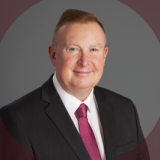Reverend Kevin McGovern, recipient of the 2023 NHMRC Ethics and Integrity Award, is one of Australia’s leading ethicists, active in education, research and policy for over 25 years. Throughout his professional life as a parish priest, academic and community leader, Reverend McGovern has brought to innumerable discussions and debates the highest quality and intensity of consideration. His reputation for the courage of his convictions and his openness and respect for others with a diversity of views is unparalleled.
Read on to find out more about Reverend McGovern’s career as an ethicist, in his own words.

It has been my privilege to contribute to ethical reflection and decision-making for most of my adult life. But what is ethics? And what is integrity?
Whether we are talking about an individual, a family or group, a nation or the international community, we can do many things. Sometimes, however, we can make poor choices. Out of habit, or in the urgency of desire or anger, we can do things which harm ourselves, disadvantage or hurt other people, or even threaten our planet. Perhaps without even being aware to it, we can initiate programs which exclude and diminish the lives of vulnerable people. Failing to recognise the diversity of our multicultural community, we can impose the values of the dominant culture on those whose values are different and thereby cause them significant moral distress.
Ethics is that process of reflection through which we seek to identify the most appropriate course of action. It requires that we listen to different perspectives, identify all alternatives, and consider the benefits and harms that these might cause.
Applied ethically, modern healthcare, medical research, and public health can provide great benefits. Applied inappropriately, they can cause considerable harm. This is why ethical reflection is so important in each of these areas.
In 2011, I was a member of the Independent Legislative Review Committee for the Prohibition of Human Cloning for Reproduction Act 2002 and Research Involving Human Embryos Act 2002 (the Heerey Review).
In my nine years on the Australian Health Ethics Committee (2012 to 2021), I served on a number of working groups. These include the committee which revised the Ethical Guidelines on the use of assisted reproductive technology in clinical practice and research (2013 to 2017), a group which looked at emerging genetic technologies (2017 to 2018), a committee which began the revisions of the NHMRC’s ethical guidelines on organ and tissue donation and transplantation (2017 to 2019), and the Mitochondrial Donation Expert Working Committee (2019 to 2020).
In my view, in some of these areas, the progress of science is an often-unstated conflict of interest. When ethically controversial new treatments are proposed, those who seek the progress of science sometimes garner public support by overstating the likely benefits of the proposed treatments. In other words, what is put forward as hope can really be hype. The scientific and research community must guard against this. Not only could it betray those whom these treatments claim to help, but it could also undermine trust in the progress of science.
In all the committees on which I served, I sought in controversial matters to uphold the right to conscientious objection. I’m grateful that there was such ready endorsement of this from other members of these committees. For me, conscientious objection – both individual and institutional – is a requirement of the multiculturalism of Australia. I acknowledge the leadership of the National Health and Medical Research Council (NHMRC) in upholding conscientious objection. At a time when voices have been raised in opposition to this right, I hope that the NHMRC continues its leadership in this area.

